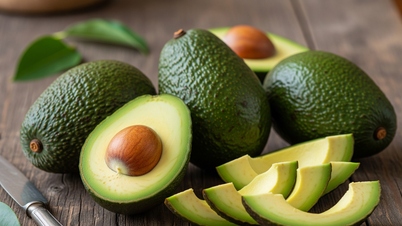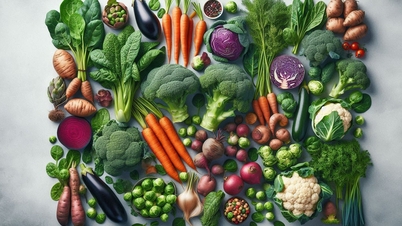Recommended fruit intake for men and women
The United States Department of Agriculture (USDA) recommends that fruit consumption should account for about 1/4 of the diet, specifically:
Adult women: 1.5-2 cups (about 200-300 grams)/day.
Adult men: 2-2.5 cups (about 300-375 grams)/day.
Of this, at least half should be fresh fruit. Additionally, for dried fruit, you should only consume half a cup/day (about 60-75 grams).
Although eating fruit is better than processed candy, it should still be combined in a balanced way with lean protein and healthy fats. Fruit cannot provide all the nutrients the body needs, if you eat too much, you may miss the opportunity to consume other important food groups such as vegetables, beans, seeds and nuts, according to Everyday Health (USA).

Fruits are rich in vitamins, minerals, carbohydrates, fiber and antioxidants that are essential for overall health.
PHOTO: AI
Some people may need to eat more fruit than recommended, such as athletes or young men who exercise a lot. People with chronic constipation should add kiwi, prunes, or pears to increase fiber; people recovering from illness or surgery need water-rich, easily digestible, and nutrient-dense fruits. Vegans and vegetarians also often use more fruit to replace animal foods.
Risks and side effects of eating too much
According to nutritionist Julia Zumpano, Cleveland Clinic (USA), if eaten too much, the fiber in fruit can cause digestive symptoms such as:
- Flatulence, bloating.
- abdominal cramps
- Heartburn.
- Diarrhea.
- Constipation.
In addition, the following subjects also need to pay attention when consuming fruit:
People with intestinal diseases (IBS - irritable bowel syndrome or IBD - inflammatory bowel disease): Difficulty to tolerate fructose, prone to bloating, abdominal pain, diarrhea.
Diabetics : Fruits are rich in carbohydrates (starch) and natural sugars, eating too much can cause high blood sugar, which is especially worrying for diabetics. A very small amount of fruit sometimes contains up to 15 grams of carbs, equivalent to a small handful of grapes, blueberries or strawberries. Therefore, paying attention and properly allocating portions when consuming fruit is very important for this group of patients.
5 tips for eating delicious, healthy and economical fruit
- Prioritize whole fresh fruit: Avoid juices because they lose a lot of fiber and nutrients.
- Combine fruit with lean protein and healthy fats: Apples and nut butter, grapes and low-fat cheese, blueberries and almonds…
- Serving size estimate: One serving is about the size of a tennis ball (1 cup).
- Limit dried fruit: Very sweet, and difficult to control dosage.
- Eat seasonal fruit: Cheaper and retains more vitamins and minerals than off-season fruit.
Source: https://thanhnien.vn/an-bao-nhieu-trai-cay-la-qua-nhieu-co-gay-tac-dung-phu-khong-185250917215311449.htm


![[Photo] Prime Minister Pham Minh Chinh chairs the 16th meeting of the National Steering Committee on combating illegal fishing.](https://vphoto.vietnam.vn/thumb/1200x675/vietnam/resource/IMAGE/2025/10/07/1759848378556_dsc-9253-jpg.webp)





























![[Photo] Super harvest moon shines brightly on Mid-Autumn Festival night around the world](https://vphoto.vietnam.vn/thumb/1200x675/vietnam/resource/IMAGE/2025/10/07/1759816565798_1759814567021-jpg.webp)






































































Comment (0)